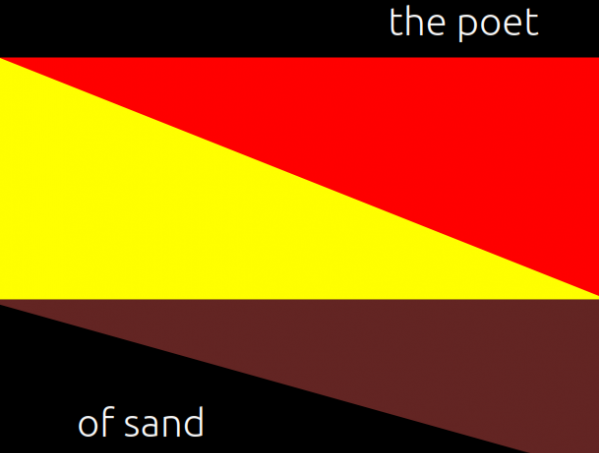To the Romantic poet, P. B. Shelley, “poets are the unacknowledged legislators of the world.”
To Wole Soyinka, the power of the poet is not that of a legislator—a law maker—but of a vagabond.
The poet is “restless seeker,” he writes in Samarkand and Other Markets I Have Known, and it is this restlessness coupled with the infinite and “uncharted routes of knowledge” he explores that makes the poet a seer and poetry a divination.
Umar Sidi’s “The Testament of Sand” flows from this centuries-long conversation about what sort of labor constitutes the work of the poet.
“The Testament of Sand,” originally published here on Brittle Paper is the longest poem in Umar Sidi’s poetry chapbook titled The Poet of Sand, recently published by Saraba Magazine. {Free Download HERE}
Every poem in the collection, including the lovely introduction, written by Richard Ali, is a gift to all poetry lovers. But it is in “The Testament of Sand” that Sidi shows the extent of his skill as a seasoned poet.
“Testament of Sand” is set up as an address to a mysterious figure named Al Arshad, the poet of sand, dust, the testaments, and of mud.
Sidi said in an email conversation that the figure came out of a need for company. He wanted to go on an intellectual quest. The quest started out as a personal journey but ended up becoming an excursion into the deeper mysteries of life.
As with all adventures, it helps to have a companion, so he invented Al Arshad. But a good reader would sense that Al Arshad is nobody’s companion.
He is something so much darker and dangerous. Al Arshad is Faust and Mephistopheles wrapped into one but he is also Sidi’s response to Soyinka’s Ogun.
When Sidi poses the question of God, the human, or the cosmos, Sidi begins with detritus—sand, dust, mud—and ends with the body—the erotic, biological, animal, figural body. Something ties Eve’s love of “monstrous” and “delicious” penises, God’s life-making power, and the “cosmic soup” implicated in the big bang.
It is the story of that “something” that Sidi tries to tell in this most unusual work.
“The Testament of Sand” holds the reader under the spell of beautiful writing.
and when God said let there be light, You were there, as the Form of the photon,
the tiniest quark of dust
and when God peeped into the void, You were there as the shadow of darkness
omnipresent in the nothingness of things
and when God said let the universe be, You were there as the big that banged, the bang
that bigged
and when God said let us shape the destiny of Man, You were there as the pen and
the scroll, the scribbles and the scribe
Stunned by the array of sensations, sounds, rhythm, images, structural play and the invocation of figures from Islam, Christianity, quantum mechanics, Greek philosophy, African mysticism, it feels like one isn’t just reading a poem but worshiping on the alter of profane thought.
Sidi’s poem is a mash-up of elements from the Koran, the Ifa literary corpus, Pythagoras, the Bible, Socrates, Egyptology, theory of evolution.
It is a poem about butterflies and apples, about black holes and dinosaurs, about sex and vowels.
{Free Download of The Poet of Sand HERE}










COMMENTS -
Reader Interactions